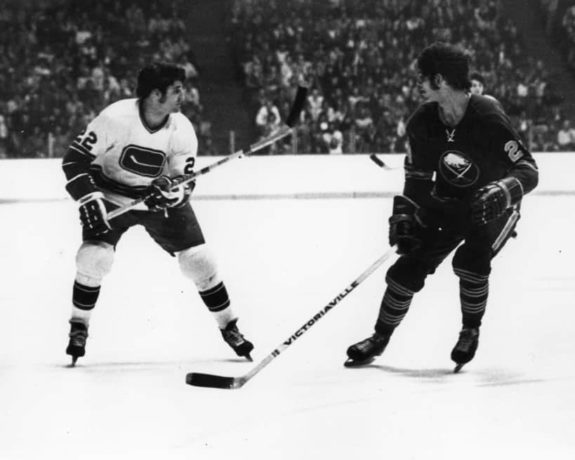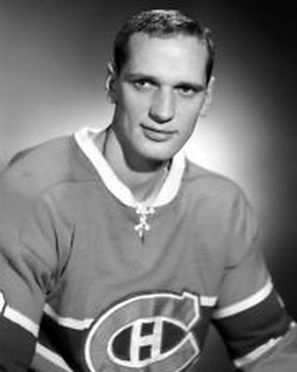This is the second in a series of articles in which I explore a significant trade for each Vancouver Canucks season, starting with their inaugural season of 1970-71. Without a doubt, the most significant trade the Canucks made during their first season was acquiring future captain Andre Boudrias from St. Louis. From the offseason through to the end of 1971-72, the Canucks made a total of 11 trades, none of which had the impact of the Boudrias deal.
The biggest midseason trade saw the Canucks move defenseman Gary Doak and forward Jim Wiste to the New York Rangers in exchange for forwards Dave Balon, Ron Stewart, and Wayne Connelly. Balon was a decent get for the Canucks, scoring 22 goals in 116 games over two seasons in Vancouver while Connolly had 34 points in 53 games in 1971-72. Stewart had minimal impact and was traded back to the Rangers later that season.
There was another trade I’d rather focus on though, and it came before the 1971-72 season even started. It didn’t necessarily make a lot of waves, but the deal landed the Canucks a versatile piece for their roster. On May 25, 1971, Canucks general manager Bud Poile sent cash along with third and fourth-round picks in the following month’s NHL Amateur Draft to the Montreal Canadiens for the Habs’ third-round pick and defenceman Gregg Boddy.
Gregg Boddy
Boddy bounced around a little bit after being chosen in the third round, 27th overall by the Los Angeles Kings in the 1969 NHL Amateur Draft. He played one season with the American Hockey League’s Springfield Kings before being traded to the Montreal Canadiens in a six-player deal in May 1970. Boddy spent the 1970-71 season with the Habs’ AHL affiliate and put up 17 assists in 63 games, but he had yet to play an NHL game.
Happy 68th b'day to stay at home D-man Gregg Boddy who added some offense in 74-75 when he tallied 11 goals for the Canucks. pic.twitter.com/TOOvwJsQK0
— O-Pee-Chee Stars (@opeecheestars) March 20, 2017
Flexible enough to be used as a defenceman or a forward, the Ponoka, Alberta native spent half of the 1971-72 season with the Canucks but also played 28 games with the Rochester Americans of the AHL. He had seven points in 40 games with the Canucks and eight points in 28 games in the American League. His numbers don’t necessarily stand out, but Boddy did make an impression in Vancouver, even winning a Canucks fastest skater competition during his first season with the team.
The following season, Boddy established himself on the Canucks’ roster as a regular at the age of 23 and played 74 games. He finished the 1972-73 season with a career-high 14 points. Used primarily in a checking role, Boddy played another 159 games for the Canucks between 1973 and 1976. During the 1975-76 season, in addition to 34 games with the Canucks, he also spent 24 games in the minors with the Tulsa Oilers of the Central Hockey League.

Boddy left the Canucks and signed with the World Hockey Association’s San Diego Mariners for the 1976-77 season and then played two more seasons in Japan before retiring in 1979. Over his 273-game career with the Canucks, he finished with 23 goals, 44 assists and 263 penalty minutes. Despite not being a prolific scorer, four of Boddy’s 23 goals were game-winners.
Richard Lemieux
Although not part of the trade at the time of its announcement, Richard Lemieux is the player the Canucks drafted with the 39th overall pick they received from the Canadiens. Not big in stature, Lemieux was a skilled centre who made the jump from the Montreal Junior Canadiens to the Canucks in the 1971-72 season. He spent 34 games in the minors in his first season as a pro and put up impressive totals of 24 points in 34 games as a 20-year-old. Lemieux also got into 42 games with the Canucks, scoring seven goals while adding nine assists.
Happy 65th b'day to centreman Richard Lemieux who had his best season in 72-73 when he recorded 52 pts for Canucks. pic.twitter.com/yrXMjgwucM
— O-Pee-Chee Stars (@opeecheestars) April 20, 2016
Lemieux broke out for 17 goals and 52 points in 78 games during his sophomore season of 1972-73 but dipped to just 22 points in 72 games in 1973-74. The Canucks left Lemieux exposed in the 1974 Expansion Draft and he was selected 37th overall by the Kansas City Scouts. His final stats with the Canucks show a pretty respectable 29 goals and 61 assists in 192 games over three seasons.
The Draft Picks
At the time of the trade, the Canadiens were coming off their third Stanley Cup in four seasons and had the depth to give up a player like Boddy, who wasn’t likely to crack a blue line featuring future Hall of Famers Jacques Laperriere, Guy Lapointe, and Serge Savard. The Habs’ roster depth meant they weren’t likely looking for a player off the Canucks in return, which is why Poile was able to peddle two 1971 draft picks and cash.

With the 31st pick, the Canadiens took forward Jim Cahoon from the University of North Dakota. He was coming off a season in which he posted 25 goals in 24 games for UND and turned pro two years after the trade. Cahoon didn’t get into any games with the Canadiens during his professional career and played five seasons with their AHL affiliate, the Nova Scotia Voyageurs, winning a Calder Cup twice. Although a valuable member of the Voyageurs and a solid minor pro player, he retired following the 1977-78 season.
The fourth-round pick that the Canadiens got from the Canucks was 45th overall and the Habs selected defenceman Ed Sidebottom from the Western Canadian Hockey League’s Estevan Bruins. He had just finished his third WCHL season when drafted and was a First Team All-Star in the league. Sidebottom joined the Canadiens organization in 1971-72, playing for their International Hockey League affiliate, the Muskegon Mohawks. He wound up playing with four teams in three different leagues over three seasons and retired in 1974 at just 23-years-old.
A Lopsided Trade
The Canucks wound up acquiring two players in Boddy and Lemieux who would play a combined 465 games for the franchise, while the Canadiens got two players who didn’t play a single NHL game between them. Unless the amount of cash the Canucks gave up to get Boddy and the draft pick which would become Lemieux was a massive amount, this trade could be considered one of the most lopsided in franchise history.